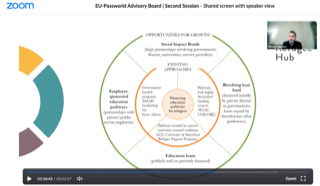
Financing education pathways for refugees: Advisory Board meeting
The second meeting of the EU-Passworld Advisory Board took place online on Monday, 12 December 2022.
The Board provides strategic guidance to project partners in Belgium, Ireland and Italy. It connects the dots to relevant experiences and actors in other countries; offers practical tips to address challenges that partners face in programme design and implementation; helps with monitoring and evaluation; and supports the dissemination of project results, lessons learned and good practices.
The 13 members of the Board are professionals with diverse backgrounds, profiles and skillsets who can look at EU-Passworld from different perspectives – challenging key assumptions, asking hard questions and spotting weaknesses. Two Board members have lived experience of displacement and have arrived in Europe through education or labour pathways.
After its inaugural meeting in May of this year, the Board convened on 12 December for a deep dive on how to finance education pathways – an issue that project partners have been grappling with over the past few months as part of the policy design process of new education pathway programmes. The session was an opportunity to gather expert feedback on a toolkit on financing education pathways that the Refugee Hub is working on and that will be finalized by mid-2023.
Participants started by focusing on the opportunities and challenges of existing approaches to resource education pathways, zooming in on Italy’s university corridors for refugees. UNICORE has grown very quickly in just 4 years – going from 6 scholarships in 2019 to 69 places offered for the 2022-2023 academic year – and community engagement has definitely played a role in this rapid scale up.
The second part of the session looked at several innovative ways to finance education pathways. Specific options discussed were revolving loan funds; education loans; employer-sponsored education pathways; and social impact bonds.
Last week’s Advisory Board meeting provided an opportunity for a rich exchange that will be continued through bilateral conversations. Key themes raised included the benefits of diversifying partners and funding streams; the importance of covering coordination and operational costs in order to achieve sustainability and scale; the differences between fundraising for early pilots and ‘tried and tested’ initiatives; and the need to carefully select the financing modality that best suits each specific programme and context (for instance, loans may not work for pathways that offer displaced students short-term residence status or in contexts where it’s not certain that they will find a job right after graduation).
The EU-Passworld Advisory Board will meet again in the spring of 2023. In the meantime, the Refugee Hub will incorporate the Board’s reflections in the next version of the toolkit and develop similar guidance on how to finance labour pathways.
